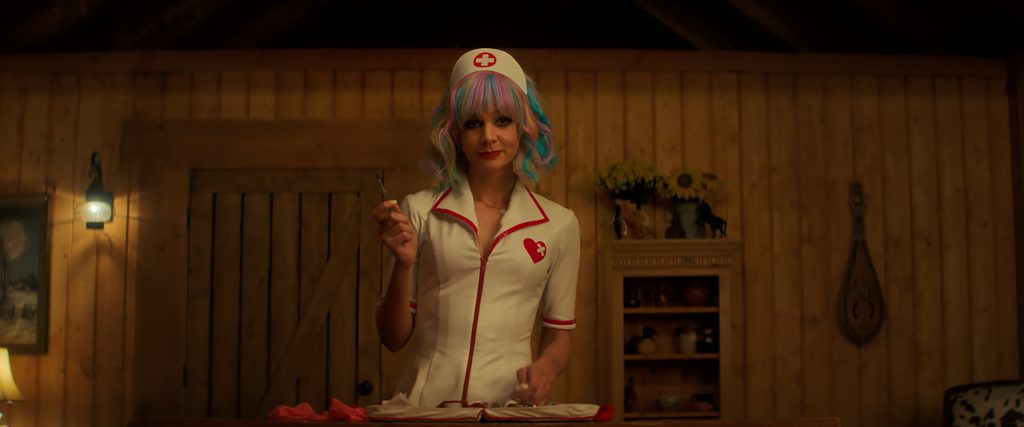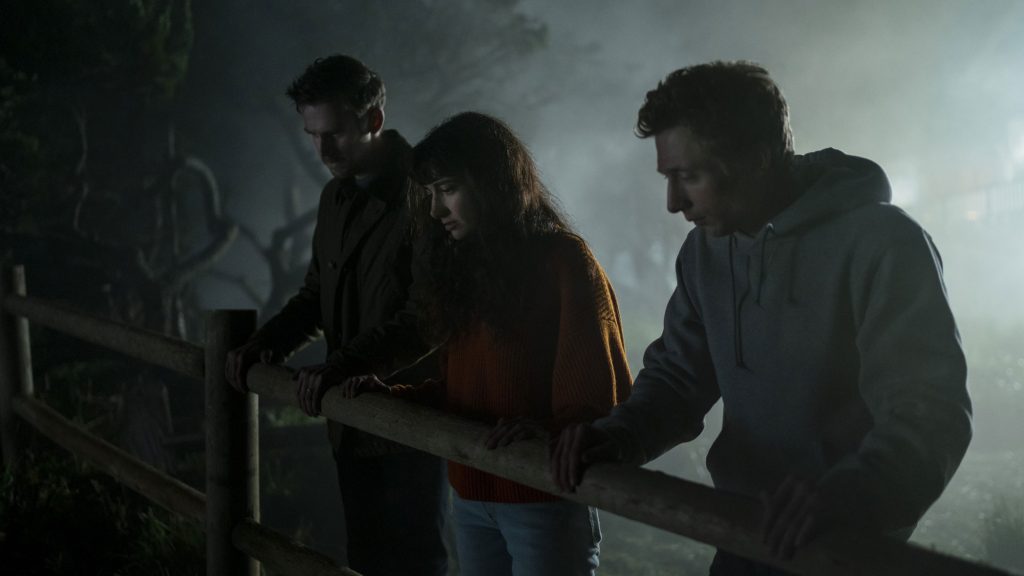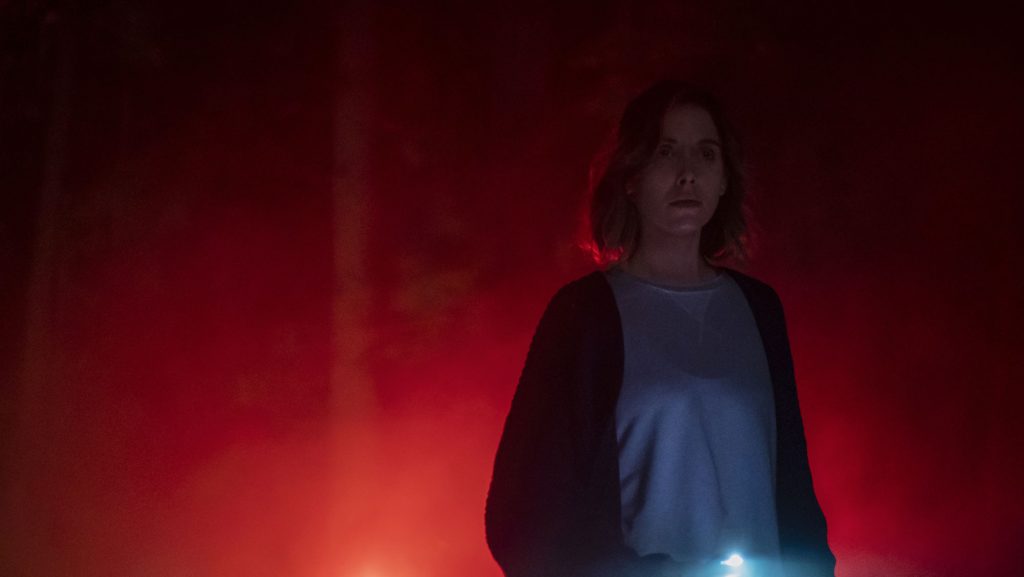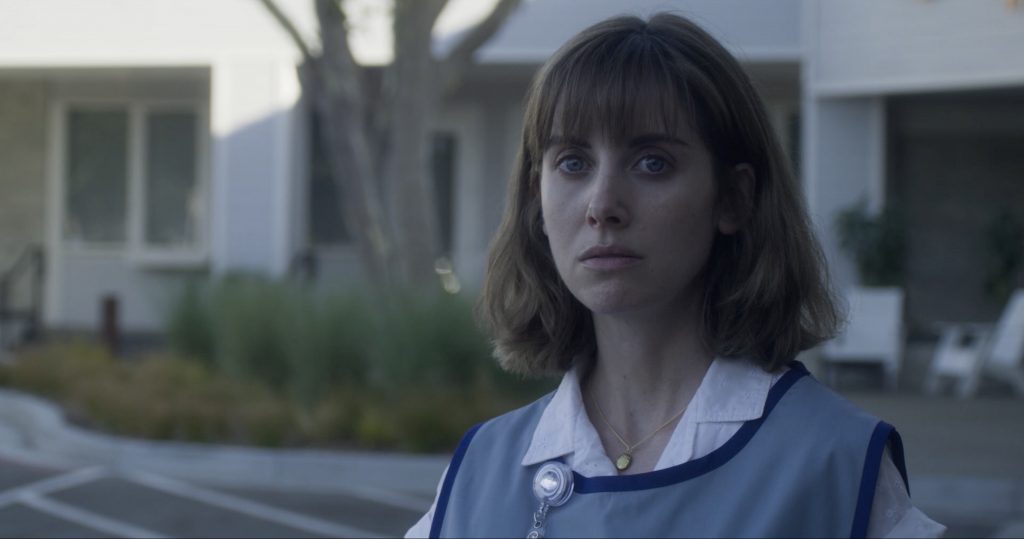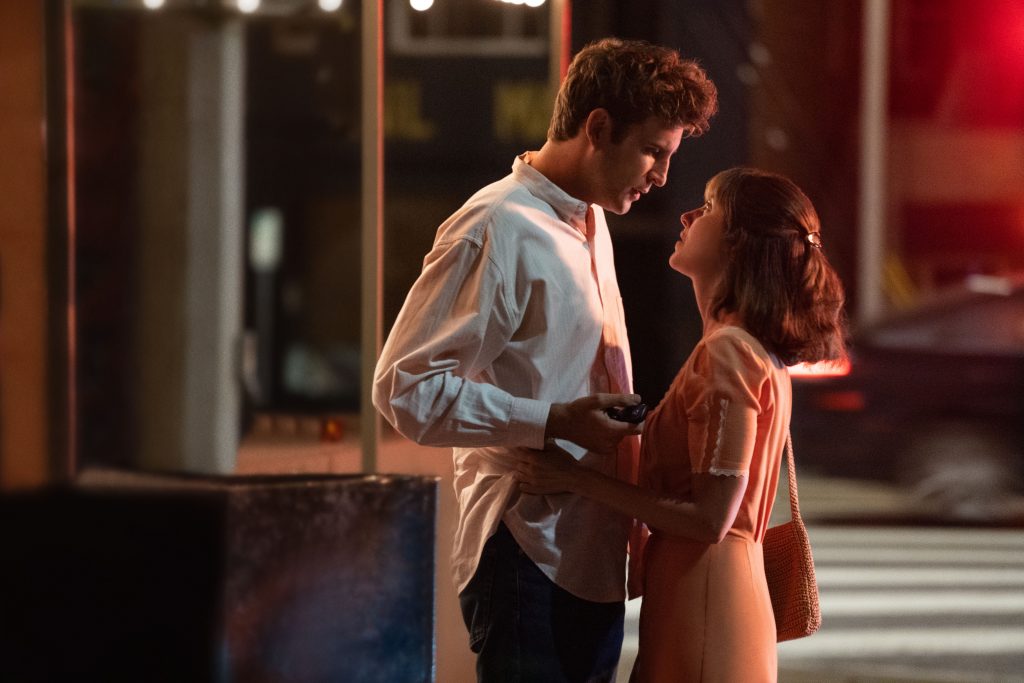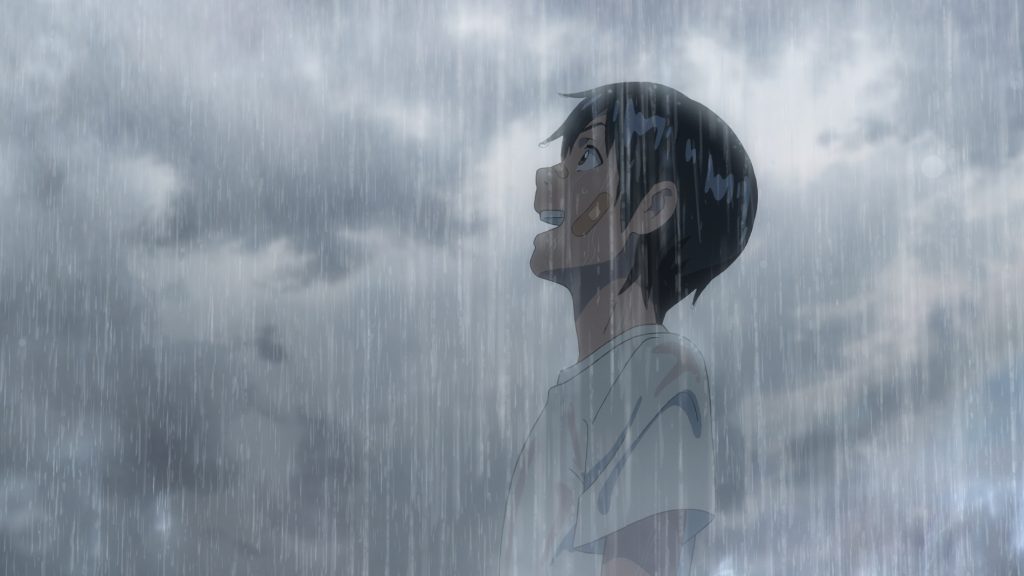October 26, 2023
by Carla Hay
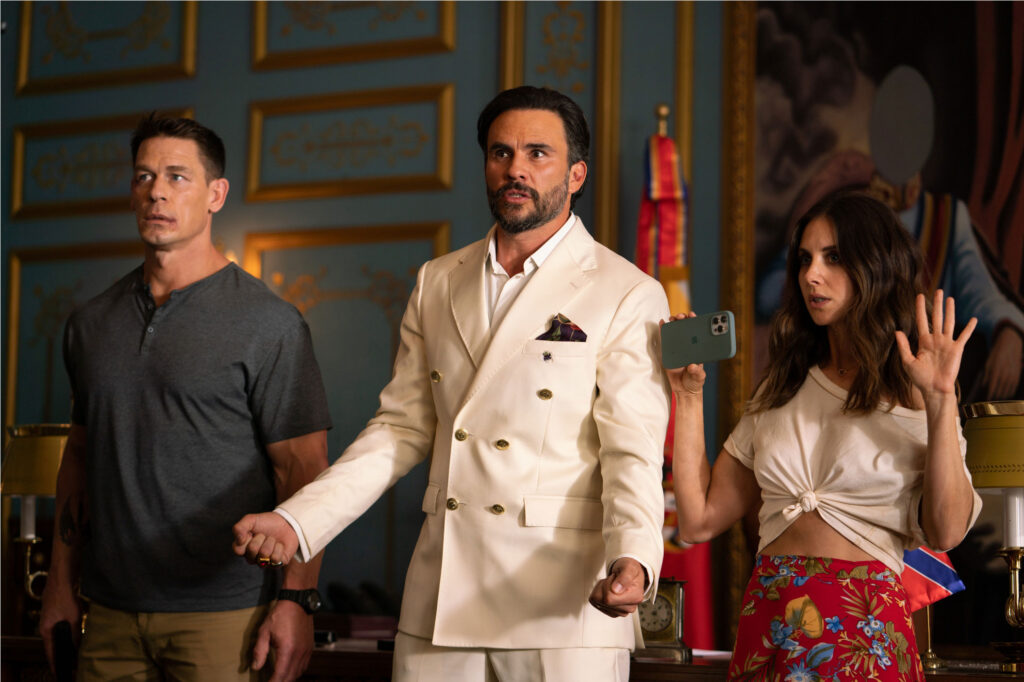
Directed by Pierre Morel
Culture Representation: Taking place in the U.S. and in the fictional South American country of Paldonia, the action comedy film “Freelance” features cast of white, Latin and indigenous characters representing the working-class, middle-class and wealthy.
Culture Clash: A former U.S. Army special forces operative, who hates his current job as small-time attorney, is convinced to take a freelance job as a security guard for a journalist interviewing a South American dictator, who is the target of an assassination plot, putting all three of them in danger.
Culture Audience: “Freelance” will appeal primarily to people who are fans of John Cena, Alison Brie and any mindless action flick with a lazy and predictable plot.

Watching the horrible action comedy flick “Freelance” is like being stuck in a putrid cesspool of idiocy, much like the film’s main characters are stuck in a swampy jungle. The cast members have no chemistry with each other. The plot is formulaic junk. The dialogue and scenarios strain to be funny but just fall with a lumbering and clumsy thud.
Directed by Pierre Morel and written by Jacob Lentz, “Freelance” is a failure on every level except for the movie’s shoot-out scenes, which succeed at being obnoxious and are really just distractions for a flimsy story. All of the stars of “Freelance” look like they really don’t want to be there but couldn’t resist whatever they were paid for this embarrassing train wreck. It’s the worst type of comedy film: one that has no self-awareness of how atrocious the jokes are.
Morel’s main claim to fame is directing the first “Taken” movie, which was released in 2008. “Freelance” is Lentz’s debut as a feature film screenwriter, after being a TV writer who’s worked a lot with Jimmy Kimmel. It would explain why there’s a weak sitcom/sketch comedy tone to “Freelance” that does not work well in this feature film.
“Freelance” is just a mishmish of clichés and ripoffs from much better action flicks where a good-looking and macho “protector” is matched with an uptight and sarcastic woman who likes to think of herself as very independent. She doesn’t want him to be there, as they navigate their way through dangerous terrain. Throw in lazy and awful stereotypes of people from South American countries, and you have the sheer stupidity of “Freelance.”
The movie’s very thin concept is bloated by repetitive scenes of shootouts and other violence, in addition to an unrelenting stream of witless dialogue and acting that range from looking bored to being absolutely cringeworthy. In the beginning of the movie, viewers see the main protagonist is Mason Pettits (played by John Cena), who gives occasional self-pitying voiceover narration. As Mason tells it, he was in law school and on a fast track to a conventional and tedious life, when he dropped out of law school to join the U.S. Army.
While in the Army, he joined a special forces unit, which Mason says became his “true purpose” in life. “For the first time in my life, I was happy,” Mason remembers. One day, Mason and his team members were on a secret mission to assassinate a South American dictator named Juan Venegas (played by Juan Pablo Raba), the ruthless president of a fictional country called Paldonia. Mason and others were in a helicopter that was attacked by gunfire. The helicopter crashed, leaving Mason with injuries that forced him to honorably discharge from the Army.
After leaving his Army life behind, Mason graduated from law school and became an attorney. He got married to a woman named Jenny (played by Alice Eve), and they have a daughter named Casey. The movie does a quick montage to show these life milestones for Mason, until it fast-forwards to Casey (played by Molly McCann) being 8 years old. Mason now has his own law practice, where he is the only attorney. He makes a comfortable income where he can support his family and live a middle-class life.
The problem is that Mason hates his job and despises having a routine life. “I went back to the normal life I tried to avoid,” Mason says in a voiceover. “I couldn’t feel more like a failure.” Never mind that he doesn’t appreciate having good health and a loving family, because Mason’s narcissism knows no bounds. As an example of what type of work he’s doing as a lawyer, an early scene in the movie shows Mason being hired by a weirdo named Scott (played by Felipe Andrés Echavarría), who wants Mason to represent him in a billing dispute that Scott has with a phone company. Scott pays a retainer fee that’s a measly $500.
It’s around the same time that Mason is contacted by a former U.S. military colleague named Sebastian Earle (played by Christian Slater), whom Mason hasn’t seen in years. Sebastian used to work with Mason when they were in the U.S. Army’s special ops together. For the past seven years, Sebastian has owned and operated Contracted Defense Initiatives, a company that mostly does secretive security jobs that are related to politics or government.
Sebastian, who is a slick salesman type, tells Mason that he wants to hire Mason for a “one-off” security gig, where Mason would have to be the bodyguard for a TV journalist who’s doing an exclusive interview with Juan Venegas. Mason blames Juan for the botched mission that caused Mason’s injuries that ended Mason’s military career. Mason immediately says no for that reason and because Mason thinks he’s too old for that type of security job.
However, Mason can’t seem to leave his combat mentality behind. When Casey tells him that a boy has been bullying her at school, Mason advises Casey to punch the boy in the face and in the penis. But when Casey takes his advice, she gets into trouble at the school. The boy’s father is also a lawyer, according to Jenny, who has to deal with this mess.
It’s the last straw for Jenny, who feels that Mason has become bored with their marriage. Jenny also thinks that Mason is disrespectful of her wish to teach Casey how to deal with problems in a non-violent way. Jenny tells Mason that she wants a separation and will be moving in with her mother and taking Casey.
This marital separation prompts Mason to change his mind about Sebastian’s job offer, since Mason wants to spend some time away from home to get away from his personal problems. When Mason arrives in Paldonia, he describes the nation this way: “It’s like a Tim Burton movie: colorful but creepy as fuck.” (“Freelance” was actually filmed in Colombia.) Mason’s unease with Paldonia is because the country is in political turmoil over Juan’s leadership. All signs indicate that Juan might be assassinated in a coup.
The TV journalist who is supposed to be protected by Mason is Claire Wellington (played by Alison Brie), who has recently been disgraced and forced to resign from her job because she used untruthful sources she didn’t verify. Lately, Claire has been doing superficial entertainment reporting, which Claire thinks is beneath her skills, because she would rather be covering hard news. The movie never really explains how Claire landed an exclusive interview wth Juan (who is described as someone who almost never does interviews), but she needs a bodyguard because being around Juan can be very dangerous.
Predictably, when Claire and Mason first meet each other, they have a clash of personalities. Vain and snooty Claire thinks that Mason is just an air-headed lug. She’s shocked to find out that Mason is an attorney, but she still treats him like a servant.
Meanwhile, Mason dislikes Claire’s condescending attitude and thinks she’s underestimating the danger they could be in for this interview. Thankfully, “Freelance” doesn’t do the stereotypical subplot of having sexual tension between Mason and Claire. There is no sexual tension, because these two characters (and the cast members portraying them) have no chemistry together.
Juan, who is a bachelor, is the type of dictator who dresses in designer suits and thinks he can charm anyone, especially women. Not surprisingly, he makes inappropriate comments to Claire in a pathetic attempt to seduce her. Juan is disliked by the “common folks” in his country, as evidenced by a schoolgirl of about 8 years old, who shows Juan her middle finger when his car is driving through a working-class area. “Freelance” is so poorly written and sloppily edited, it jumps from one scene to the next, with very little cohesion.
In a small caravan of SUVs driving through a jungle, one of the SUVs has Juan, Claire and Mason in it, when the caravan is attacked by gunshots. It’s an assassination attempt on Juan, but the would-be assassins are so moronic, they shoot at the wrong SUV. Juan, Claire and Mason then escape into the jungle. The rest of “Freelance” is a jumbled mess of shootouts and chase scenes, as Juan, Claire and Mason spend time together and apart, trying not to get killed by Juan’s enemies.
Other characters in this shoddy story are one-dimensional and vapid. Jorge Vásquez (played by Sebastián Eslava) is Juan’s buffoonish nephew, who wants to take control of Paldonia. Colonel Jan Koehorst (played by Marton Csokas) is a trusted military ally of Juan’s. There’s also a subplot involving an indigenous tribe, whose chief (played by Diego Vásquez) and other tribe members are such hollow characters, they aren’t even given names in the movie.
Cena is doing another version of the characters he tends to play: hulking brutes who need redemption. Brie seems to have put some effort to her performance, but her talent always looks out of place in this low-quality flick. Raba hams it up a little too much and plays Juan as a smarmy salesman instead of as a menacing dictator. And even though Slater shares top billing in “Freelance,” his Sebastian character is in the movie for less than 15 minutes.
“Freelance” alternates between being painful to watch and being downright dull. It’s like watching a stand-up comedian do jokes that bomb, one right after the other. But in this movie’s case, there really are explosive bombs and gunfire going off amid all the bad comedy. The action scenes, which could have been the saving grace of this dumpster film, are irritating to watch and have no credibility or suspense.
All the loud violence in the movie won’t be enough to erase the groans of disgust that some viewers might have when seeing how much “Freelance” insults viewers’ intelligence. Other viewers might be shocked into silence at how terrible “Freelance” is and might wonder if this lousy flop will get any worse. It does. The ending is trash and makes no sense—just like it makes no sense for anyone to watch “Freelance” after being warned about how worthless and annoying it is.
Relativity Media will release “Freelance” in U.S. cinemas on October 27, 2023.

